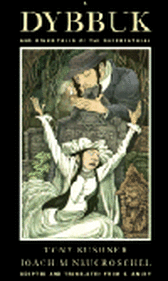Synopsis
A Dybbuk
Published by Theatre Communications
9 Male 5 Female
In an illuminating adaptation by Tony Kushner, this can indeed be the stuff of supremely affecting drama
Like all enduring myths born of collective experience, A Dybbuk strikes responsive chords that scientific and psychological explanations have never been able to still
The play addresses a primal, universal yearning: the desire to have a dialogue with the dead, with all the guilt, hope and dread that this encompasses
The idea that dead men tell no tales may be of comfort to murderers, but it has been vigorously resisted by writers from Homer to contemporary playwrights as diverse as Herb Gardner, August Wilson and Mr Kushner in his great Angels in America
As the critic Eric Bentley pointed out years ago, there is indeed something compellingly theatrical in the central device of a dead man inhabiting the body of the woman he loved in vain
In this sense, the play shares the more blatant romantic appeal of love-beyond-the-grave classics like `Wuthering Heights'
The play has been substantially restructured, from four acts into three, with a concluding second-act scene that gives explicit voice to the religious doubts of Rabbi Azriel, the exorcist who dominates much of the play
Still, those who haven't read A Dybbuk recently may not realize just how much Mr Kushner has altered it, since most of the play's inherent imagery and themes are already implicit - sexual division, racial self-awareness and (since this is Tony Kushner, after all) a glimmer of apocalyptic apprehension" ~ Ben Brantley, The New York Times
 $16.99
$16.99